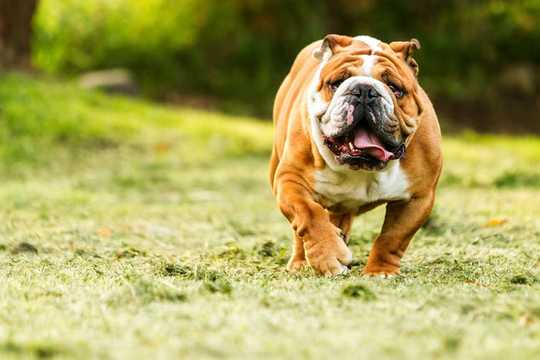
Flat-faced breeds, like the bulldog, were at greater risk. Ammit Jack/ Shutterstock
As temperatures begin to warm up, it might be tempting to take your dog for a long walk or run to soak up the weather while it lasts. But it’s important to exercise caution, as dogs can easily develop heatstroke in hot temperatures.
However, some dogs are at greater risk of heatstroke compared to others. Our latest research has identified which dog breeds are most likely to suffer from heatstroke.
We found that nine breeds, in particular, had a significantly higher risk of heatstroke compared to labrador retrievers:
Get The Latest By Email
- chow chow (17 times more likely to suffer from heatstroke)
- bulldog (14 times more likely)
- French bulldog (six times)
- French mastiff (five times)
- greyhound (four times)
- cavalier King Charles spaniel (three times)
- pug (three times)
- English springer spaniel (three times)
- golden retriever (three times)
Purebred dogs had twice the risk compared to crossbreeds. The labrador retriever (traditionally the UK’s most popular breed) had a similar risk to crossbreeds, so we used it as the model breed for comparisons.
Most of the breeds at higher risk of heatstroke are brachycephalic (flat-faced). In fact, brachycephalic dogs had twice the odds of suffering heatstroke than dogs with an average muzzle (like labradors). Brachycephalic dogs are more likely to overheat because they often already struggle to breathe, even at rest. Effective panting is essential for cooling, as dogs cannot sweat like humans.
Over a third of brachycephalic dog owners have previously reported their pet struggled with “heat regulation”. The growing popularity of flat-faced breeds, coupled with rising global temperatures, could see heatstroke become a major welfare risk to these dogs in the future unless action is taken to prevent them from overheating – or reducing their popularity altogether.
The chow chows and golden retrievers also had increased risk of heatstroke because of their thick “double coats”. A thick coat acts as insulation, trapping hot air and limiting heat loss if the dog overheats. It would be like having to wear a thermal jacket during a heatwave.
 Golden retrievers can overheat because of their thick fur. sanjagrujic/ Shutterstock
Golden retrievers can overheat because of their thick fur. sanjagrujic/ Shutterstock
Heavy dogs also showed an increased risk of heatstroke. Importantly, this group includes both obese dogs and dogs that are large or muscular. Large dogs, in general, were more likely to develop heatstroke than dogs under 10kg, with giant breed dogs (weighing over 50kg) three times more likely to develop heatstroke.
Dogs aged over two years old were also at greater risk, with elderly dogs (over 12 years) most likely to develop heatstroke. This is because younger dogs may be more active, while older dogs with reduced cardiovascular and respiratory function and may struggle to lose excess heat as efficiently.
The study included over 900,000 UK dogs and used historical, anonymised veterinary records, so included roughly 10% of the estimated UK dog population. In 2016, the fatality rate for heatstroke cases in the UK was 14%, meaning one in seven dogs with heatstroke died from their condition.
The number of dogs experiencing heatstroke was relatively low, just 0.04% of the population (or one in every 2,500 dogs). However, this study used data from 2016, and temperature records have since been broken. The intensity and frequency of heatwaves is predicted to increase in the future.
Preventing heatstroke
Any dog can develop heatstroke if left or exercised in a hot environment. For any dog, it’s far safer to skip walks altogether during hot weather and you may need to find ways to keep your dog cool, such as paddling pools, fans and grooming. However, owners of the breeds highlighted by this study should be particularly cautious in hot weather.
If your dog is on the larger side, you need to be careful regardless of their breed, especially if they are a large or giant breed. If your dog is overweight, they are not only at increased risk of heatstroke but also other potentially fatal conditions such as joint disease and cancer. Helping your dog shed excess weight will help them feel more comfortable in hot weather and will reduce their risk of heatstroke.
If you have an older dog, you should also be cautious exercising them in the heat. Dogs with underlying health problems affecting their heart or breathing are particularly at risk and may need help keeping cool during warm weather.
Despite annual campaigns, owners still continue to put their pets at risk by leaving dogs unattended in car parks. Dog’s don’t just overheat in hot cars.
Exercising in hot weather can be just as dangerous and can prove fatal. Owners of dogs identified as being at particular risk of heatstroke should be especially cautious and should avoid any situation that could put the dog in danger from overheating.
Knowing the signs of overheating is key to stop the conditions progressing. They typically include:
- panting constantly and noisily
- looking distressed
- dark, blue or red gums and tongue – the tongue may appear much longer than usual
- confusion, unsteady on their legs, lying down more or even collapsing
- diarrhoea, vomiting or going off food
- acting strangely or having a fit
If you’re worried that your dog is too hot, seek veterinary advice immediately and start cooling your dog straight away.
Some quick ways of cooling dogs include getting them into the shade, using cool water and using cool air. Avoid covering your dog with wet towels as it may trap heat and don’t let them drink water too quickly.
As temperatures continue to rise, more dogs will become at risk of heatstroke. Protecting your dog from hot environments and preventing them from overheating is the best way to keep them safe.![]()
About The Author
Emily J Hall, Senior Lecturer in Veterinary Nursing, Nottingham Trent University; Anne Carter, Lecturer in Animal Biology, Nottingham Trent University, and Dan O'Neill, , Royal Veterinary College
This article is republished from The Conversation under a Creative Commons license. Read the original article.
books_pets







